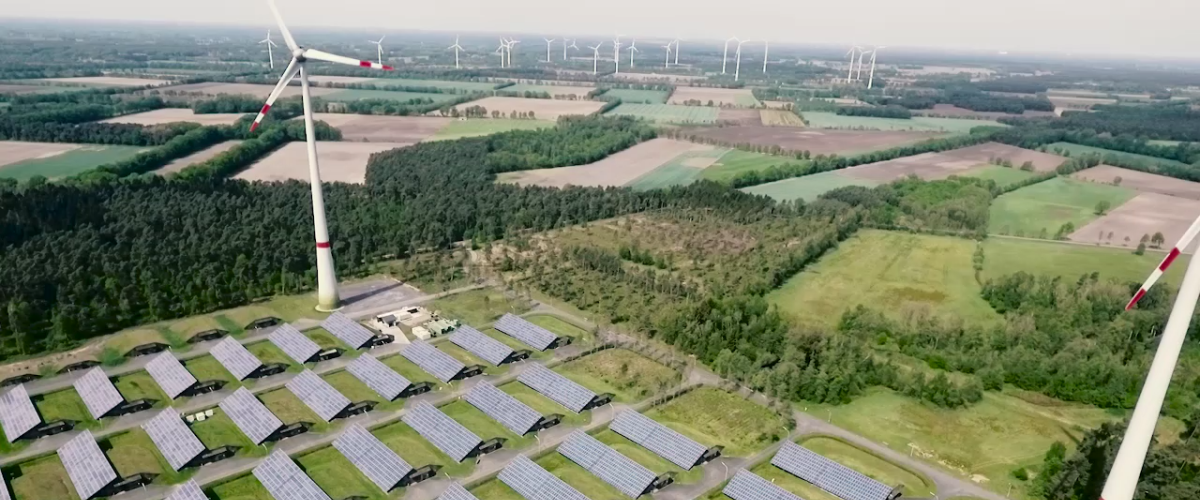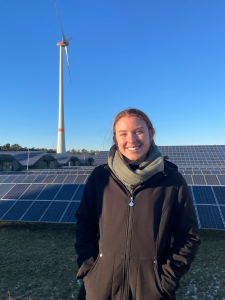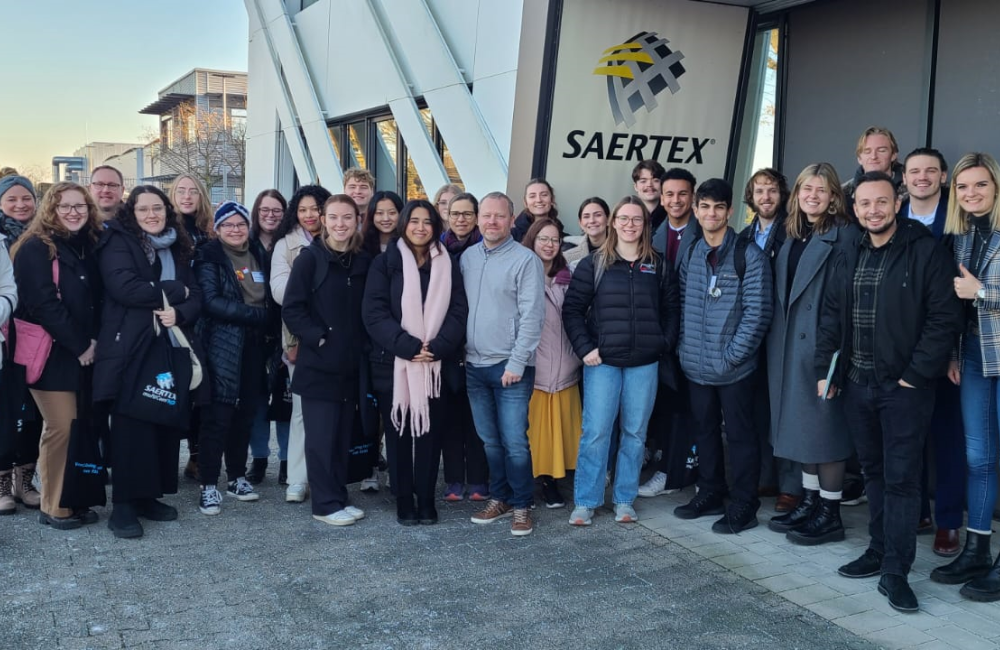
Revolutionizing renewables: Students bring back insights from Germany short course
CFANS students participated in a Minnesota delegation to Germany to for a case study in renewable energy systems.

Sarah Hagenow is a third-year student majoring in Agricultural and Food Business Management with a minor in International Agriculture. She traveled to Germany during short-course CFAN 3520, "Leading the Renewables Revolution," focusing on Germany's growing renewable energy system in Saerbeck, an agricultural town of 7,000 in Munsterland, North Rhine Westphalia on its way to climate neutrality, a European Energy Awardee and a Climate Smart Municipality partner with Morris, Minnesota.

Agriculture is one of the “backbone” industries of our society, producing food, fuel, and fiber for so many people across the globe. As an agricultural business major, I understand the importance of food production but I also recognize the environmental impact that it’s had. Sustainability is a forefront concern within agriculture, so I wanted to take advantage of this short-course, CFAN 3520, "Leading the Renewables Revolution," and learn more about sustainable practices in other sectors. I knew that this course would give me great insight into finding and using viable energy sources, conserving inputs, and implementing methods that can lessen agriculture’s carbon footprint. Not only that, this program focuses on political action that can help municipalities and organizations adopt greener energy systems. I have a sincere interest in policy and legislative action, so meeting with German political officials piqued my interest immensely. Since politics handles many different and often competing interests, I viewed this as a chance to gain more knowledge about the energy sector and develop a broader understanding of current issues.
We witnessed community collaboration at the Bioenergy Park in Saerbeck. Saerbeck is a climate-focused municipality in North-Rhine Westphalia, located about 20 minutes from Munster. To achieve their goals of implementing renewable energy, the city came together with some private investors to transform a former German ammunition base into a greener energy park. We had the chance to tour the grounds and hear from community members, which was absolutely inspiring.

One aspect that I found particularly fascinating was the park’s anaerobic digester plant, which is owned by local farmers. Of course I recognized the agricultural importance of this practice and the connection back to farming, but I was also just in awe of the communal support behind such a large project. Farmers, civilians, businesses, schools, and leaders have all come together to realize this project. Everyone acts towards a common goal, which really opened my eyes to the importance of communication and believing in a cause. Everyone in Saerbeck believes that their small town can make a difference, which is why they most certainly have.
This program only bolstered my interest because I witnessed the power that public decisions can have on private companies and interests. Working in sustainable agriculture policy would allow me to combine my economic and business passions with building a more sustainable future in food production.
I think sustainability is becoming a focus in any career, so while I certainly want to include sustainability in my future profession, I will need to focus on it regardless. The next generation of leaders is tasked with securing a more equitable future for the economy, the environment, and people, which is no small responsibility. However, I know that I want to be one of these leaders. I want to help our economy remain resilient while making sure every person has a spot at the table and that we can act in harmony with the global ecosystem. In my classes, we are always centering our studies around sustainability to prepare us for the future. This course then gave me hands-on experience with these concepts and allowed me to interact with the leaders who are making it happen.
As part of my degree, I am looking to secure a minor in international agriculture. I believe we live in an increasingly globalized world, so being able to appreciate cultural differences, recognize international relations, and collaborate across borders is crucial going into the future workforce.
Particularly in agriculture, sustainably feeding a growing population with the same amount of inputs or less is a vital global task that will require cooperation amongst nations.
Before taking this course, I had virtually no knowledge of energy systems and very little awareness of the renewable energy transformation. After this program, my eyes have truly been opened. While I still intend to pursue a career within agriculture, I see many opportunities for the adoption of renewable energy practices and I’ve been very inspired by the biogas movement in Germany. Farmers and producers can have a hand in this technology, and communicating this to these stakeholders is a task in which I can envision myself taking part. One of my continuing goals is to be involved with policy.
This course in Germany allowed me to continue broadening my perspective of our world and see what sustainability actions are being taken in other countries. I also feel that this experience helped me learn about a totally new sector and add some versatility to my degree. Since I’d like to have a hand in policy-making someday, having a base knowledge of different issues and industries can help me balance many viewpoints and be successful in such a career.
I’m hoping that this spirit of collaboration and belief in one another can make its way to the United States with the help of our Minnesota delegation. I now see the role that I can play in communicating this sustainable technology to rural America and fostering community support for large projects. I saw the power that small actions can have in Saerbeck, so I want to do the same to keep small towns viable in the Midwest.
Sarah Hagenow is an Agricultural and Food Business Management major with a minor in International Agriculture. Students can learn more about CFAN 3520, "Leading the Renewables Revolution," through the Learning Abroad Center.





